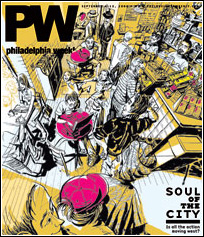The Wheel Thing
Despite brittle bones, Andrew Reid is taking the Komets to the top.
From the February 25, 2009 Philadelphia Weekly.
Andrew Reid wants the ball.
He glides down the side of the court, quickly coming to a stop near the baseline. He pivots toward the lane and waves his strong, calloused hands at his teammates.
"I'm wide open!" he bellows, scrunching his lips as he watches one of his teammates shoot the ball.
As the ball clanks off the rim, Reid spins, rolls down court, weaves in front of his frustrated opponent, and barks steadily.
"Turn, turn, turn!" he urges. "Defense!"
When one of his teammates on the Temple Rolling Owls wheelchair basketball team snags a loose ball, Reid, 15, flies back toward his basket, cuts to the corner and screams, "Kick it out!"
He catches a bounce pass, pokes his tongue out the right side of his mouth and drives toward the hoop. It doesn't matter to him that he's barely 4 feet tall and only 110 pounds. Reid dribbles into a crowd of older, beefier players from the Delaware Destroyers and launches a shot.
It doesn't drop but it doesn't really matter. His team is easily crushing their opponent.
And besides, Reid isn't even supposed to be here right now.
***
A sophomore at West Philadelphia's School of the Future, Reid is one of the star players on Katie's Komets, the only competitive, junior-level wheelchair basketball team in Pennsylvania. In March, the Komets will play in their fifth straight National Wheelchair Basketball championship tournament.
The team, which practices every Saturday at the Carousel House on Belmont Avenue, is open to teens with spina bifida, cerebral palsy, muscular dystrophy, cancer or any other physical or developmental challenges.
Reid has osteogenesis imperfecta, also known as brittle bones disease. He breaks easily, especially during the winter months.
"I hurt my shoulder so I'm not supposed to be playing much," he grudgingly admits.
He's supposed to be saving himself for the big tournament. He practiced with the Komets earlier in the day, but when a team he moonlights with, the Rolling Owls, has a game, Reid can't resist.
"I'm really competitive," he says. "I hate to lose. I take wheelchair basketball very, very seriously."
***
There were no wheelchair basketball teams for youth in the region until Stuart Greenberg, the former director of the Carousel House, started the team in 1996. He reached out to Joe Kirlin, a longtime welder from South Philadelphia, for sponsorship.
Kirlin's 10-year old daughter, Katie, became paralyzed from the waist down when a tumor crushed her spinal cord in 1987. Between operations, Katie competed in wheelchair games across the country. She won medals at the junior National Wheelchair Games, and set a national record in swimming.
"Playing wheelchair games gave her hope," says Kirlin, 60. "Going to all these events and seeing all these other people in a similar situation, it made her feel like she could achieve anything."
The cost of competing - travel expenses, hotels and meals - was enormous. So a group of Kirlin's neighborhood friends, mostly longshoreman, organized a charity golf tournament. They raised $800.
Katie succumbed to cancer in 1989 but the golf tournament in her honor has continued annually. The 21st event in 2008 raised more than $60,000. Over the years, Kirlin estimates they've raised more than $1.3 million, and all of the money helps defray costs for young people participating in wheelchair sports.
The Komets are the pride of the Katie Kirlin Fund. The program has a national reputation, and over the last five years, nine Komets earned scholarships to play wheelchair basketball in college. Sarah Poiesz, a current Komet, is weighing offers from several universities.
"That man is a saint," Sarah's mother, Lynne Poiesz, says of Joe Kirlin. "I don't think he even recognizes the significance of what he's doing."

***
"If I couldn't play wheelchair basketball, I don't know what I'd do," says Reid, a Wynnefield resident whose mother works two jobs. "It's really helped me out in life."
He's become a team leader, and he's more independent all around. Despite his fragile legs that can sustain his body weight only for brief periods, Reid learned to shuttle himself around the region using mass transit. He maneuvers city streets in his wheelchair while carrying his basketball wheelchair and gear.
Every day, he shoots 500 baskets and sprints numerous suicides. He lifts weights three times per week. He spends all of his free time on the court - playing, observing and absorbing everything.
"He probably knows more about the game than anyone on the team," says Jordan Prusack, coach of the Komets. "He's a born point guard, a general on the court."
Reid hopes to parlay his talents into a college scholarship. Then he wants to become a lawyer and sports agent.
His greatest fault is an insatiable love of the game.
Reid arrived at the court at 9 a.m., practiced with the Komets at noon, started the game with the Rolling Owls at 3, and he's still yapping now at 4.
"Come on!" he implores. "Let's shut them down!"
Prusack, who disapproves of Reid's extracurricular game, says, "They'll shove him out of here when they shut the lights off."









